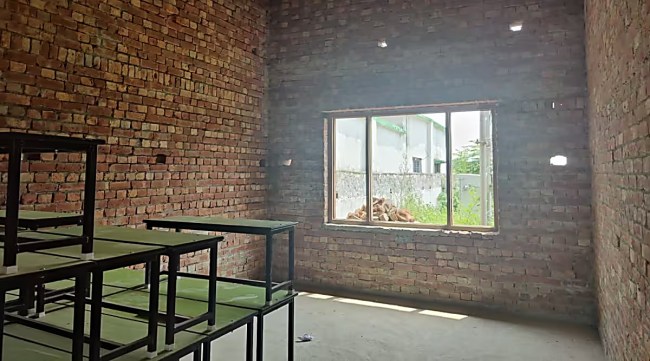Opinion View from the neighbourhood | Muzaffarnagar school row, a lion in the bazaar and Pakistan’s golden boy: What the Pakistani media is talking about
A weekly wrap-up of the issues being discussed and debated in India’s neighbourhood
 Neha Public School in Muzaffarnagar, where an incident has sparked outrage, as a teacher encouraged students to assault a Muslim classmate. (File)
Neha Public School in Muzaffarnagar, where an incident has sparked outrage, as a teacher encouraged students to assault a Muslim classmate. (File) Muzaffarnagar school incident
Last week on social media, a video of teacher Tripta Tyagi from Neha Public School in Muzaffarnagar, UP, went viral. In that, Tyagi was seen encouraging Class I students to slap their Muslim classmate while he stood in a corner, wailing. Pakistani media condemned this incident and gave due credit to Indian authorities for taking action immediately.
The Nation (August 29) says, “Hate crime seems to be the norm in India… Whether it’s through passing derogatory remarks about Islam as a religion, or through passing laws which render most Muslim citizens state-less, Modi’s government has only made living in India hell for Muslims… Surely this is something that requires immediate international attention.” Express Tribune (August 29) acknowledges the response of authorities saying, “to their credit, local education authorities sprang into action soon after becoming aware of the incident… While it is reassuring to note how quickly some government bodies did the right thing, the incident and attempts… to hush it up illustrate how even ‘safe’ spaces have been infected by the spread of supremacist right-wing ideologies.”
Pakistan’s champion Arshad Nadeem
On August 27, Arshad Nadeem became the first Pakistani to bring home a medal from the World Athletics Championships. The 26-year-old ace javelin thrower finished with a silver medal at 87.82m, just 35 cm behind India’s Neeraj Chopra. The media celebrated this emerging champion’s feat and highlighted the lack of support Nadeem received from his country, which makes this medal even more significant.
Dawn (August 29) says, “Arshad doesn’t have a sponsor; foreign training camps for him are arranged by the Athletics Federation of Pakistan — usually at places it finds financially viable… It is high time Arshad received backing to fulfil his potential.” Daily Times (August 29) uses Nadeem’s example to speak to the larger issue of inadequate support and infrastructure for Pakistan’s athletes, saying, “While his meteoric rise despite non-existent support and patronage from the state and eye on the prize year after year does narrate an extraordinary tale of perseverance, it also tugs at the glaring holes in the priorities list… Crippling mismanagement… rendered innumerable experiences as yet another easy shot for our adversaries to smear eggs in our faces.”
The great lion escape
On August 28, a lion was spotted loose in one of the busiest areas of Karachi, Sharea Faisal. As per reports, the lion escaped from a car while being taken to the vet. The spectacle generated much content on social media and led to conversations on the dangers of people keeping wild animals as pets.
News International (August 31) says, “These incidents highlight a sad truth: animals in our country are rarely shown the respect they deserve. It is not too late for the authorities. They can launch conservation programmes… Wildlife (whether kept at public zoos, private zoos, or residential buildings) should be released in the wild.” The Nation (August 31) says, “Not only were precautions not taken while transporting the lion, but keeping such exotic animals as pets in the first place is a risk to safety, for both the animal and the people in residential areas. It is imperative that legal proceedings are initiated against the owner as he was in clear violation of the Sindh Wildlife Protection Act 2020.”
A terrifying air pollution report
A recent report by the University of Chicago on Air Quality Index revealed that air pollution has taken many years off people’s lives, especially in South Asia — with Bangladesh, India, Nepal and Pakistan being named the most polluted countries in the world. The media urged all of South Asia to come together and fight this, putting aside all political differences.
Dawn (August 31) says, “considering the nature of the threat, no one country can deal with this issue on its own. Indeed, the state needs to address the key factors locally — cutting down on emissions, shifting to cleaner fuels and technologies etc — but it will take a ‘whole of South Asia’ approach for air pollution to be effectively tackled.” Daily Times (September 1) calls upon its own authorities to implement already crafted policies, saying, “Since we have already agreed upon the first National Clean Air Policy, common sense dictates that the environmental ministries follow the respective recommendations to work towards the set goals. The country needs a pair of functional lungs to worry about other crises.”
Sugar shortage crisis
Pakistan is currently going through a major sugar shortage due to both the former PTI government’s mismanagement as well as the PDM government’s inability to take accountability. Sugar reserves for domestic consumption have dwindled to just about 2.3 million metric tonnes (barely enough to meet consumption this season) with prices going up to Rs 165/kg from Rs 85/kg earlier this year.
Express Tribune (September 1) says, “Recent news of falling sugar reserves and rising prices have been followed by new reports suggesting the sugar mafia was directly making policies relating to the commodity during the PDM government’s tenure, with some going as far as accusing the sugar barons and the PDM of fudging the numbers earlier this year to justify permission for exports… It is also worth noting that large amounts of sugar for domestic consumption are smuggled to Afghanistan, also without any consequence for the smugglers.” The Nation (August 30) says, “The role of the Economic Coordination Committee (ECC) in this crisis cannot be overlooked, as it did not exercise enough vigilance in ensuring the well-being of the citizens… It is imperative for the ECC to be held accountable for its role in these decisions.”
adya.goyal@expressindia.com






